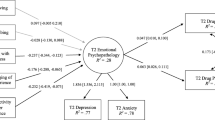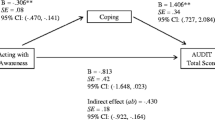Abstract
Trait mindfulness has been considered a protective factor against alcohol use behaviors; however, the specific trait mindfulness facets, the specific alcohol use behaviors, and the mechanism underlying this relationship remain unclear. The present study examined the relationship between specific trait mindfulness facets and specific alcohol use behaviors, and how cued alcohol cravings might mediate this relationship. High-risk, young adult, undergraduate social drinkers (n = 240, 75 % Caucasian, 70 % female, mean age 19.4 years) completed a series of questionnaires and reported their level of alcohol cravings following alcohol pictorial cue exposure. Trait mindfulness was associated with less problematic alcohol use (r = −0.19, p < 0.01) but was not associated with alcohol use quantity (r = −0.07, p = 0.30) and duration (r = -0.08, p = 0.21). Only acting with awareness was associated with all types of alcohol use behaviors—including less problematic alcohol use (β = −0.18, p = 0.02), lower alcohol use quantity (β = -0.16, p = 0.04), and shorter alcohol use duration (β = −0.19, p = 0.02). Cued alcohol cravings mediated the negative associations of overall trait mindfulness (b = −0.50, p < 0.05) and acting with awareness (b = −0.32, p < 0.05) with problematic alcohol use, and the negative associations of acting with awareness with alcohol use quantity (b = −1.24, p < 0.05) and alcohol use duration (b = -0.34, p < 0.05). These findings suggest that the protective effect of trait mindfulness likely operates through reducing cued alcohol cravings and might be most specific to acting with awareness among college students, thus suggesting a differential role of separate trait mindfulness facets in this high risk group.
Similar content being viewed by others
References
Babor, T. F., de la Fuente, J. R., Saunders, J., & Grant, M. (1992). The alcohol use disorders identification test: guidelines for use in primary health care. Geneva: World Health Organization.
Baer, R. A., Smith, G. T., Hopkins, J., Krietemeyer, J., & Toney, L. (2006). Using self-report assessment methods to explore facets of mindfulness. Assessment, 13, 27–45.
Bodenlos, J. S., Noonan, M., & Wells, S. Y. (2013). Mindfulness and alcohol problems in college students: the mediating effects of stress. Journal of American College Health, 61, 371–378.
Bohn, M. J., Krahn, D. D., & Staehler, B. A. (1995). Development and initial validation of a measure of drinking urges in abstinent alcoholics. Alcoholism: Clinical and Experimental Research, 19, 600–606.
Bowen, S., & Enkema, M. C. (2014). Relationship between dispositional mindfulness and substance use: findings from a clinical sample. Addictive Behaviors, 39, 532–537.
Bowen, S., & Marlatt, A. (2009). Surfing the urge: brief mindfulness-based intervention for college student smokers. Psychology of Addictive Behaviors, 23, 666–671.
Bowen, S., Witkiewitz, K., Dillworth, T. M., & Marlatt, G. A. (2007). The role of thought suppression in the relationship between mindfulness meditation and alcohol use. Addictive Behaviors, 32, 2324–2328.
Bowen, S., Witkiewitz, K., Clifasefi, S. L., Grow, J., Chawla, N., Hsu, S. H., & Larimer, M. E. (2014). Relative efficacy of mindfulness-based relapse prevention, standard relapse prevention, and treatment as usual for substance use disorders: a randomized clinical trial. JAMA Psychiatry, 71, 547–556.
Bramm, S. M., Cohn, A. M., & Hagman, B. T. (2013). Can preoccupation with alcohol override the protective properties of mindful awareness on problematic drinking? Addictive Disorders and Their Treatment, 12, 19–27.
Brooks, M., Kay-Lambkin, F., Bowman, J., & Childs, S. (2012). Self-compassion amongst clients with problematic alcohol use. Mindfulness, 3, 308–317.
Chiesa, A., & Seretti, A. (2014). Are mindfulness-based interventions effective for substance use disorders? A systematic review of the evidence. Substance Use and Misuse, 49, 492–512.
Christopher, M., Ramsey, M., & Antick, J. (2012). The role of dispositional mindfulness in mitigating the impact of stress and impulsivity on alcohol-related problems. Addiction Research and Theory, 21, 429–434.
Collins, R. L., Parks, G. A., & Marlatt, G. A. (1986). Social determinants of alcohol consumption: the effects of social interaction and model status on the self-administration of alcohol. Journal of Consulting and Clinical Psychology, 53, 189–200.
Eisenlohr-Moul, T. A., Walsh, E. C., Charnigo, R. J., Lynam, D. R., & Baer, R. A. (2012). The “what” and the “how” of dispositional mindfulness using interactions among subscales of the five-facet mindfulness questionnaire to understand its relation to substance use. Assessment, 19, 276–286.
Ewing, S. W. F., Filbey, F. M., Chandler, L. D., & Hutchison, K. E. (2010). Exploring the relationship between depressive and anxiety symptoms and neuronal response to alcohol cues. Alcoholism: Clinical and Experimental Research, 34, 396–403.
Fernandez, A. C., Wood, M. D., Stein, L. A. R., & Rossi, J. S. (2010). Measuring mindfulness and examining its relationship with alcohol use and negative consequences. Psychology of Addictive Behaviors, 24, 608–616.
Field, M., Duka, T., Eastwood, B., Child, R., Santarcangelo, M., & Gayton, M. (2007). Experimental manipulation of attentional biases in heavy drinkers: do the effects generalize? Psychopharmacology, 192, 593–608.
Garland, E. L. (2009). Biopsychosocial Assessment of a Mindfulness-Oriented Cognitive Intervention for Alcohol Dependent Adults (Doctoral dissertation, University of North Carolina).
Garland, E. L. (2011). Trait mindfulness predicts attentional and autonomic regulation of alcohol cue-reactivity. Journal of Psychophysiology, 25, 180–189.
Garland, E. L., & Roberts-Lewis, A. (2013). Differential roles of thought suppression and dispositional mindfulness in posttraumatic stress symptoms and craving. Addictive Behaviors, 38, 1555–1562.
Garland, E. L., Gaylord, S. A., Boettiger, C. A., & Howard, M. O. (2010). Mindfulness training modifies cognitive, affective, and physiological mechanisms implicated in alcohol dependence: results of a randomized controlled pilot trial. Journal of Psychoactive Drugs, 42, 177–192.
Garland, E. L., Boettiger, C. A., Gaylord, S., Chanon, V. W., & Howard, M. O. (2012). Mindfulness is inversely associated with alcohol attentional bias among recovering alcohol-dependent adults. Cognitive Therapy and Research, 36, 441–450.
Hayes, A. F. (2012). PROCESS: A versatile computational tool for observed variable mediation, moderation, and conditional process modeling. Retrieved from http://www.afhayes.com/public/process2012.pdf.
Hingson, R. W., Zha, W., & Weitzman, E. R. (2009). Magnitude and trends in alcohol-related mortality and morbidity among U.S. college students ages 18-24, 1998-2005. Journal of Studies on Alcohol and Drugs, 16, 12–20.
Kabat-Zinn, J. (2003). Mindfulness-based interventions in context: past, present, and future. Clinical Psychology: Science and Practice, 10, 144–156.
Karyadi, K. A. (2013). The Interactive Effects of Alcohol Cravings, Cue Reactivity, and Urgency on College Student Problematic Drinking (Master’s thesis, Indiana University Purdue University in Indianapolis).
Karyadi, K. A., VanderVeen, J. D., & Cyders, M. A. (2014). A meta-analysis of the relationship between trait mindfulness and substance use behaviors. Drug and Alcohol Dependence, 143, 1–10.
Leigh, J., & Neighbors, C. (2009). Enhancement motives mediate the positive association between mind/body awareness and college student drinking. Journal of Social and Clinical Psychology, 28, 650–669.
Leigh, B. C., & Stacy, A. W. (2004). Alcohol expectancies and drinking in different age groups. Addiction, 99, 215–227.
Mason, B. J., Light, J. M., Escher, T., & Drobes, D. J. (2008). Effect of positive and negative affective stimuli and beverage cues on measures of craving in non treatment-seeking alcoholics. Psychopharmacology, 200, 141–150.
Murphy, C., & MacKillop, J. (2012). Living in the here and now: interrelationships between impulsivity, mindfulness, and alcohol misuse. Psychopharmacology, 219, 527–536.
National Institute on Alcohol Abuse and Alcoholism (2006). Alcohol Alert: Young Adult Drinking. http://pubs.niaaa.nih.gov/publications/aa68/aa68.htm. Retrieved October 13, 2014.
Nolen-Hoeksema, S. (2004). Gender differences in risk factors and consequences for alcohol use and problems. Clinical Psychology Review, 24, 981–1010.
Pavlick, M. N. (2007). The relationship of cue-exposure, reactivity, and craving in binge-drinking college students (Doctoral dissertation, Bowling Green State University).
Price, C. J., Wells, E. A., Donovan, D. M., & Rue, T. (2012). Mindful awareness in body-oriented therapy as an adjunct to women’s substance use disorder treatment: a pilot feasibility study. Journal of Substance Abuse Treatment, 43, 94–107.
Rogojanski, J., Vettese, L. C., & Antony, M. M. (2011). Coping with cigarette cravings: comparison of suppression versus mindfulness-based strategies. Mindfulness, 2, 14–26.
Ryan, J. J., Kreiner, D. S., Chapman, M. D., & Stark-Wroblewski, K. (2010). Virtual reality cues for binge drinking in college students. Cyberpsychology, Behavior and Social Networking, 13, 159–162.
Shorey, R. C., Brasfield, H., Anderson, S., & Stuart, G. L. (2014). The relation between trait mindfulness and early maladaptive schemas in men seeking substance use treatment. Mindfulness, 1–8.
Sinha, R., Fox, H. C., Hong, K. A., Bergquist, K., Bhagwagar, Z., & Siedlarz, K. M. (2008). Enhanced negative emotion and alcohol craving, and altered physiological responses following stress and cue exposure in alcohol dependent individuals. Neuropsychopharmacology, 34, 1198–1208.
Wallace, J. M., Brown, T. N., Bachman, J. G., & Laveist, T. A. (2003). The influence of race and religion on abstinence from alcohol, cigarettes and marijuana among adolescents. Journal of Studies on Alcohol and Drugs, 64, 843–848.
Witkiewitz, K., & Bowen, S. (2010). Depression, craving and substance use following a randomized trial of mindfulness-based relapse prevention. Journal of Consulting and Clinical Psychology, 78, 362–374.
Witkiewitz, K., Bowen, S., Douglas, H., & Hsu, S. H. (2013). Mindfulness-based relapse prevention for substance craving. Addictive Behaviors, 38, 1563–1571.
Witkiewitz, K., Warner, K., Sully, B., Barricks, A., Stauffer, C., Thompson, B. L., & Luoma, J. B. (2014). Randomized trial comparing mindfulness-based relapse prevention with relapse prevention for women offenders at a residential addiction treatment center. Substance Use and Misuse, 49, 536–546.
Wupperman, P., Marlatt, G. A., Cunningham, A., Bowen, S., Berking, M., Mulvihill‐Rivera, N., & Easton, C. (2012). Mindfulness and modification therapy for behavioral dysregulation: results from a pilot study targeting alcohol use and aggression in women. Journal of Clinical Psychology, 68, 50–66.
Acknowledgments
This research was supported by a National Institute on Alcohol Abuse and Alcoholism training grant fellowship, T32 AA07462, awarded to Kenny A. Karyadi.
Author information
Authors and Affiliations
Corresponding author
Rights and permissions
About this article
Cite this article
Karyadi, K.A., Cyders, M.A. Elucidating the Association Between Trait Mindfulness and Alcohol Use Behaviors Among College Students. Mindfulness 6, 1242–1249 (2015). https://doi.org/10.1007/s12671-015-0386-7
Published:
Issue Date:
DOI: https://doi.org/10.1007/s12671-015-0386-7




